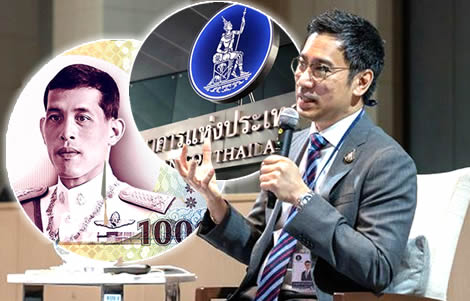On November 6th, Thailand’s foreign reserves stood at ฿7.7 trillion, an increase of 1.2% in 7 days since October 30th. The currency, despite Thailand’s lopsided economy driven by robust exports, has once again become a target of global funds who see a return to a multilateral world order following the still contended US Presidential election and the anticipated inauguration of Joe Biden as American President on January 20th next.
The Bank of Thailand intervened on Friday to halt the sharp rise of the Thai baht since the beginning of November. The decisive action came at the behest of the new Bank of Thailand Governor, Sethaput Suthiwart-Naruepu, who held his first Monetary Policy Committee meeting on Wednesday. As the seven-member panel reviewed the economy, one of the points of discussion at the meeting was the polarised nature of liquidity within Thailand’s financial system, a situation aggravated by the Covid-19 pandemic and coming as the country’s accumulated household debt has skyrocketed to historically high levels.

The Bank of Thailand, in an about-turn, moved decisively this week to limit the appreciation of the Thai baht which, by Monday, had risen by 4.3% since the last Monetary Policy Committee meeting on September 23rd, held under the previous governor, Veerathai Santiprabhob who was replaced on October 1st by Sethaput Suthiwart-Naruepu.
The surge in the baht was particularly marked after the contentious outcome of the US presidential election which has seen funds being diverted into emerging and global markets. The US dollar has lost ground by as much as 3% since early November.
‘Unheard of’ briefing by Bank of Thailand where a range of measures to allow baht outflows was revealed
However, the intervention this week, including a press briefing on Friday, which one Singapore analyst, Howie Lee of Oversea-Chinese Banking Corp Ltd described as ‘unheard of’ has seen the baht lose ground by approximately 0.5%.
‘The briefing this Friday on how to tame the baht strength is new and unheard of,’ Mr Lee said. ‘Baht traders may be expecting reasonably strong measures out of Friday and the baht is reacting ahead of that meeting’.
The moves that were announced on Friday consisted, in the main, of facilities to allow increased outflows of the local currency and speculation by Thai investors in foreign holdings to counter the sharp spike in the inflow of funds.
Bangkok based analysts say it will be difficult holding back the tide of a rising baht if global order is renewed
Most financial and investment analysts in Bangkok feel that it will be difficult to hold back the tide of the strengthening baht even with the robust measures announced this week by Thailand’s central bank, most of which will come into effect before the end of the month and some in the first period of 2021.
The strengthening baht may be seen as a reflection of a weakening dollar based on an anticipated Biden presidency which looks like, at least in the medium term, seeing a reversion to an era of increased and more harmonious global trade while also allowing for a possible constitutional crisis as US President Donald Trump and his legal team, doggedly pursue claims of a rigged and fraudulent US election.
Moves aimed squarely at financial speculators
The measures announced this week are aimed squarely at speculation on the baht as well as Thai based securities and holdings driven by large fund managers.
Among them, is a move to allow Thai based investors to purchase increased levels of foreign currency-denominated holdings with fewer restrictions.
The moves were outlined by Assistant Bank of Thailand Governor Vachira Arromdee at Friday’s briefing.
Ms Vachira explained that foreign currency deposit account holders in Thailand will have greater scope to manage foreign currency-denominated funds in the kingdom and to purchase foreign securities including funds traded on the stock exchange.
Thailand’s Security Exchange Commission will allow such funds and products to be listed in Thailand.
Thai investors will also be allowed to trade in bonds but must pre-register with authorities to do so. This was one of the measures that will not be in place until early next year.
‘The rapid appreciation of the baht may affect the fragile recovery of the Thai economy,” the assistant Bank of Thailand governor, explained. Ms Vachira said that the central bank ‘had closely monitored and intervened in the market as necessary to limit excessive currency volatility’.
Baht reached a 10 month high against the US dollar on Monday and prompted a quick government response
The Thai baht hit a 10 month high against the US dollar on Monday just above the psychologically important 30 baht to the dollar rate.
It drew a quick response from the government which this week had some cause for optimism after figures for Thailand’s third-quarter GDP performance showed a less than anticipated contraction with exports leading the charge.
Finance Minister, Arkhom Termipittayapaisith, said he would discuss the matter with the new Bank of Thailand governor Mr Sethaput Suthiwart-Naruepu who had earlier signalled a more hands-off approach.
Warning from Bangkok analysts about allowing more Thai funds and investment activity offshore
Indeed many Bangkok based analysts believe that a Biden presidency in the US and a return to the globalised world order, that existed before the US presidency of Donald Trump and his US-China trade war, must precipitate a stronger baht.
Head of Capital Markets at Kasikorn Bank, Kobsidthi Silpachai, even expressed some concern that the moves could heat up Thailand’s stable and flat inflation environment by moving investment and economic activity offshore.
Stability of inflation is a key metric and a core responsibility of Thailand’s independent central bank.
Strength of the Thai baht can be explained by Thailand’s growing level of currency reserves
The strength of the Thai baht, in a world market and financial environment that is more benign and open to trade, cannot be denied.
Up to the end of last year, it had become a magnet for foreign investment funds and speculators because of Thailand’s remarkably strong level of currency reserves which stood, on November 6th, at ฿7.7 trillion, itself a 1.2% increase since October 30th.
Monetary Policy Committee meeting on Wednesday gave a better insight into the nature of the economy
On Wednesday, there was also a particularly informative report from the first Monetary Policy Committee meeting chaired by the new Bank of Thailand Governor Mr Sethaput.
The meeting of the seven-member committee agreed unanimously to keep Thailand’s benchmark borrowing rate at a historic low of 0.5% at this time and to monitor what appears to be the beginning of a tentative recovery.
However, the secretary of the committee, Mr Titanun Mallikamas, in his briefing afterwards made some astute observations as he summarised the discussions at the meeting for the press.
One was the need for the bank to decisively intervene to stem the rising currency which threatened the export-led recovery.
Imbalance of liquidity within the financial system
The second observation was the top-heavy nature of Thailand’s financial liquidity where the bulk of financial assets and funding is held by a small minority of account holders.
The imbalance of liquidity in the system has been aggravated by the Covid-19 crisis which has seen higher bad debt levels and increased credit risk, a situation that dilutes any beneficial impact of the lower interest rates as banks have tightened lending policy.
The third is the issue of weak household income despite a slight improvement in the labour market seen in the third quarter of the year.
The underemployment of unskilled or casual labour is exacerbating the rise in household debt within the financial system which is at unprecedented levels and projected to reach 90% of GDP by the end of the year.
2019 survey showed 93% of funds in Thai bank accounts held by 10% of account holders
A survey at the end of 2019 by the Puey Ungphakorn Institute of 80 million Thai bank accounts showed that 93% of total funds amounting to ฿12 trillion were held by just 10% of account holders.
Other key concerns for the Thai economy, at this point, are rising and increasingly violent political protests and tensions between the government and activists, the ongoing Covid-19 pandemic worldwide until a vaccine based solution can be implemented and niggling concerns at the US presidential outcome where Thai officials are banking on the inauguration of US President-elect Joe Biden on January 20th 2021 and a return to the stability of a multilateral world order.
Get all our latest stories, follow Thai Examiner on Facebook here
Further reading:
Strengthening baht predicted as investors bet on a reopening of Thailand to mass tourism in 2021
World’s biggest free trade deal just signed will be a huge boost for the Thai economy and exports
RCEP deal agreed as India opts out – busy Bangkok ASEAN summit concludes on a low key
Chinese FM to visit Thailand in a Covid battered world of raised tensions and potential conflict
Prime Minister indicates that the cabinet reshuffle will be complete very shortly with no problem
Thailand’s economy has become dependent on government expenditure to stay above water
Thailand and US aim for a new more ‘proactive’ trading relationship as ambassador meets Prayuth
Rice price spike but drought conditions to recede – security concern for the Mekong river
US suspension of Thai preferential trade partner status part of Trump’s ongoing trade war


















